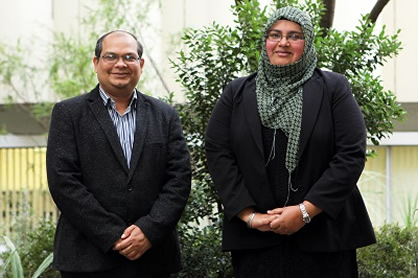
Dr Shyamal Das and Dr Shakila Rizwan.
Lecturers Dr Shyamal Das and Dr Shakila Rizwan have been identified as 'research leaders of tomorrow', recently securing Health Research Council funding via emerging researcher grants.
Dr Das, a senior lecturer in pharmaceutical sciences, receives NZ$143,767 to undertake research to develop a powder formulation of anti-tuberculosis drugs.
Dr Rizwan, a lecturer in pharmaceutics and pharmaceutical technology, receives NZ$137,636 to develop a new platform technology containing anti-epileptic drugs for intranasal delivery to suppress seizures in drug-resistant epilepsy.
Eight of the nine emerging researcher grants in the HRC's 2015 funding round were won by up-and-coming researchers from the University of Otago.
The university's research and enterprise deputy vice-chancellor, Richard Blaikie, is pleased by Otago's strong performance. "This stellar showing reflects the large body of highly talented early-career staff at our university who are poised to become the research leaders of tomorrow."
Dr Rizwan feels privileged to have received the grant. "I felt humbled, excited, shocked and overwhelmed all at the same time," she says. /"It's very rewarding to know that you may, through some small steps in research, contribute to changes that may make a difference for sufferers—not just of uncontrolled epilepsy, but potentially other neurological disorders—where drug-resistance is an issue."
Her project is scheduled to begin towards the end of this year and the funding will be spread over three years.
Dr Das, who is believed to be the country's only pulmonary formulation scientist, is "absolutely delighted, encouraged and humbled" to receive the funding.
Despite the availability of anti-tuberculosis drugs for almost a century, tuberculosis remains a major health problem killing millions of people annually, he says.
Current treatment strategies for tuberculosis are tablets or injections requiring high doses of multiple drugs for between 6 months to two years. Due to toxic side-effects, poor adherence to treatment is common and can lead to relapse and the development of drug-resistant strains.
Direct delivery of anti-tuberculosis drugs to the lung can help reduce these problems, he says.
Pulmonary delivery of powder formulations has enormous potential for treating other diseases like asthma, chronic obstructive pulmonary disease, lung cancer and other lung infections.
While there is outstanding research on drug discovery and development and clinical studies on these diseases in New Zealand, Dr Das says there is a dearth of research into the formulation of drugs for pulmonary delivery to treat acute and chronic lung conditions.
The School of Pharmacy has provided funding to purchase a next-generation impactor which allows him to determine the dispersion capacity of powders for inhalation.
"This Health Research Council funding will help me to set up in vitro tests relevant to pulmonary formulations, purchase new and expensive drugs and gain access to cutting edge facilities," Dr Das says.
Dr Das and Professor Ian Tucker are currently co-supervising two PhD students, Abdul Motalib Momin and Basanth Eedara, who will also contribute to the research project.
School Dean Stephen Duffull says to have two of the nine emerging researcher grants come from the School of Pharmacy is an outstanding achievement and signals school staff are among the best up-and-coming researchers in New Zealand.
Article written by Liane Topham-Kindley for Pharmacy Today, July 2015.